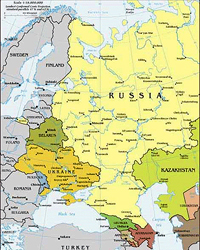Russian nationalism: tip of the iceberg

(Moscow News – themoscownews.com – Anna Arutunyan – August 5, 2013) Every few years, the specter of Russian nationalism rears its head, sending people who think they understand a thing or two about this country screaming in horror in all directions.
The reason, I think, is that in Western democracies, “nationalism” is understood as a chauvinistic sense of supremacy that a strong majority feels towards a weak, but growing (and thus threatening) minority. By contrast, the nationalism unfolding in Russia is a response to a kind of double whammy that history has dealt the country: First, ethnic Russians and minorities alike are pretty much equally vulnerable in the face of state corruption and abuse of authority; second, persistent centrifugal forces (think 21 ethnic internal republics where the situation’s far from rosy) pose a perennial threat to Russia’s territorial integrity.
Recently, two developments thrust this problem into the spotlight.
In the first case, ethnic tensions erupted in the town of Pugachyov, where locals took to the streets last month after a Chechen teenager killed a man identified as being half-Russian, half-Tartar, in a drunken brawl allegedly over a woman.
The second happened in Moscow last weekend, when a police officer trying to detain a suspected sex offender at an outdoor market was attacked by an angry mob of the suspect’s Dagestani relatives. The officer landed in the hospital with a fractured skull, and a video of the whole incident made it onto the Internet. Police took revenge by rounding up thousands of illegal migrants at markets around Moscow.
Analysts were mistaken in blaming the Pugachyov unrest on nationalist demagogues. Similar uprisings – over similarly “everyday” crimes – take place on a regular basis all over the country. In 2006, the same thing happened in the northern town of Kondopoga. When I traveled there, I found a spontaneous and disorganized protest of locals for whom the crime at hand was just a trigger for long-accumulated grievances to spill over. Yes, Russia’s disparate nationalist groups – from the mainstream LDPR party to smaller, more radical movements – jumped on the bandwagon and tried to draw political capital from the events in Kondopoga. But the unrest itself was spontaneous. Nationalist rhetoric was not the cause of it, but the effect.
Jump to the events at Moscow’s markets, and if you look close enough, you will see what locals in towns across Russia are so upset about. It comes down to a spectacular mix of police corruption and inter-ethnic dynamics.
It’s an open secret that markets in Moscow are largely controlled by ethnic diasporas. Walk into any outdoor market, and you’ll find that Russians are the minority. It’s also an open secret that market vendors pay off the police, who often run a protection racket.
Why do Russians find themselves at a disadvantage when it comes to paying off their own police? I’m not saying that diasporas are prone to corruption whereas Russians aren’t. Mikhail Pashkin, the head of the Moscow Police Union, told me about a very common problem in the markets of Northern Izmailovo: there, a Russian vendor, unlike her Azeri counterparts, was arrested and harassed by police simply because she could not afford protection money.
Standing up to corrupt police is hard enough, even when a group is organized. But Russians have a hard time organizing even when it’s to raise protection money. Why? For a mix of reasons. But what it really comes down to, I think, is lack of community, and the greater sense of vulnerability that comes in its absence.
Any tight-knit group – as many ethnic diasporas often are – is simply better-placed to play a system to its own benefit. Lacking a sense of community, many Russians see their ethnic neighbors as inherently more powerful – and feel even more vulnerable as a result. They find themselves the victims both of their own government and of the ethnic minorities (who are actually just as vulnerable – but in different ways).
Where there is no community, the government is charged with holding things together – which is why Russia’s centrifugal forces, the forces that pull it apart, are always a threat. Whenever nationalist sentiment erupts, the government is seen as both the problem and the solution – which is why a lasting answer can never be found.
